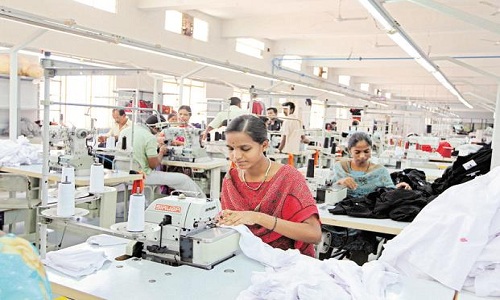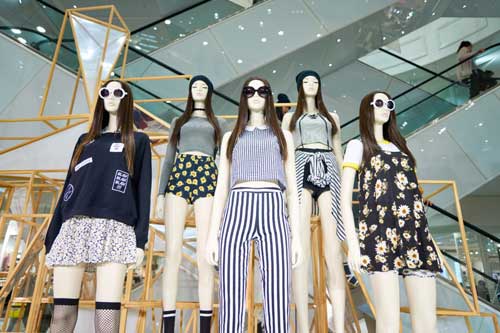FW
"Tirupur textile industry has been reeling under tremendous pressure, as a result many suicide have been reported. The land which used to be a breeding ground for self-made entrepreneurs has its own share of challenges. Since past decade, the industry has been a victim of global economic recession, steep rise in yarn prices, closure of dyeing units and labour issues. S Govindappan, VP-South India Hosiery Manufacturers Association, highlighted aggressive international competition, business slowdown in the wake of demonetisation and GST have made survival a big question."

Tirupur textile industry has been reeling under tremendous pressure, as a result many suicide have been reported. The land which used to be a breeding ground for self-made entrepreneurs has its own share of challenges. Since past decade, the industry has been a victim of global economic recession, steep rise in yarn prices, closure of dyeing units and labour issues. S Govindappan, VP-South India Hosiery Manufacturers Association, highlighted aggressive international competition, business slowdown in the wake of demonetisation and GST have made survival a big question. To top it, competition from countries like Bangladesh and Vietnam has snatched global orders from Tirupur. Banks and private lenders have tightened their purse strings when it comes to helping small businessmen in crisis.
Tough times in Tirupur

T R Vijaya Kumar, general secretary, Tirupur Exporters’ Association, added that it started with rupee appreciation or US dollar/Euro depreciation , ahead of GST implementation. It was a time when the knitwear industry was already losing its international competitiveness. The Centre promised that GST would bring down prices of raw materials but it did not happen.
While bigger companies can at least sustain the crises, small players are the ones who are the worst hit. They were not prepared to take the blow of drastic reduction in incentives given to exporters and stringent GST norms. M P Muthurathinam, President, Tirupur Exporters and Manufacturers’ Association, says small units, especially those who availed huge loans for expansion are finding it hard. According to sources, the Centre has not cleared more than Rs1,900 crore dues including GST returns, duty drawback and RoSL. But the same government has failed to restrain to its tax collecting agencies or banks to be lenient with entrepreneurs on repayments, averred Vijayakumar.
R Annadurai, Managing Trustee, Tirupur Thozhil Pathukappu Kuzhu (foundation for protection of Tirupur industries) said the organisation has formed a new wing consisting of a psychiatrist, a retired general manager of a nationalised bank, and an advocate to counsel entrepreneurs and workers who show suicidal tendencies and help them solve their financial woes.
While companies send a consignment, they have to pay 100 per cent GST to the government. But the buyer may take up to five months to settle the entire amount. Till then the company must be able to bear the burden of unpaid dues. K S Babuji, Secretary, South Collar Shirts and Inner Wear Small Scale Manufacturers Association, elaborates this was the practice for several years. But now tax collection has become stringent. Though government says GST for textiles is only 5 per cent, there are hidden taxes and they pay up to 13 per cent tax, which becomes a unbearable for small and new players.
Ultimately, it’s time the government relaxed tax norms and offer incentives to help entrepreneurs tide over the crisis. And as Raja M Shanmugam, President of Tirupur Exporters’ Association (TEA), says the Centre is making macro-economic corrections like demonetisation and GST. But it has failed to realise the importance of micro hand-holding supports like providing right rate for duty drawback and other incentives.
Technotex will be held in Mumbai on June 28 and 29, 2018. Technotex is India’s premier show on technical textiles. The event will serve as a platform for interaction between Indian and foreign companies from the technical textile value chain. It exemplifies the immense potential for trade and investment between India and foreign countries in the technical textile sector.
Technotex 2018 will pool in more than 200 participants from various parts of the world. It will also attract participation from stakeholders in the technical textile sector as well as major institutional buyers from the army, navy, paramilitary forces, railways, border roads organizations, hospitals, construction companies etc. The event is expected to register a significant growth both in terms of space, exhibitor participation and potential buyer/visitor attendance.
The aim of the event is to make India a manufacturing hub in the area of technical textiles, project the latest technological developments in technical textiles, and showcase latest products, machinery, equipments and developments in the industry for generating business and test marketing. It will also explore joint venture partnerships, project collaborations, transfer of technology, investments and R&D.
The Indian technical textile industry witnessed a significant growth of 16 per cent from 2001-10.
India will spend Rs 1,000 crores to promote research and development, technology transfer and training in the textile sector. R&D is one of the four components of the scheme. R&D projects pertaining to disease-resistant silkworm, host plant improvements, productivity enhancing tools and implements for reeling and waving etc will be done in cooperation with ministries such as Science and Technology, Agriculture and Human Resource Development.
Under R&D, a lot of focus would also be on training, transfer of technology and IT initiatives. For technology transfer, 50,000 people will be trained. Other components of the scheme include setting up seed organizations and farmers’ extension centers, coordination and market development for seed, yarn and silk products and having a quality certification system in place. A quality certification system would require creating a chain of silk testing facilities, farm based and post-cocoon technology upgradation, and export brand promotion.
The scheme aims to achieve self-sufficiency in silk production by 2022 and reduce imports to zero. To achieve this, production of high grade silk in India is expected to reach 20,650 tons by 2022. The country’s textile industry currently generates about 150 billion dollars in annual revenues — 110 billion from the domestic market and 40 billion through exports.
Fast fashion garments arrive in stores weekly or even daily and are sold at extremely low prices that consumers can replenish their wardrobes with new outfits several times a year and then throw them out as soon as they go out of fashion. Fast fashion now appears to be synonymous with disposable fashion and has consequently become the norm in Europe. Zara and Primark were early adopters of this strategy which has spread across the fashion industry. The message sent out is that since the items are cheap, it's OK to use them for only one wear.
On the flip side the real cost of a €5 T-shirt lies in the low wages and dangerous working conditions. Globalisation has permitted large scale operations to be shifted to developing countries where brands take advantage of lax regulations and cheap labour which are a fraction of that in Europe, quicker and more flexible deliveries at the lower cost. Following such pressures, smaller factory owners pass on the costs to the workers they employ. Globalisation has opened up the number of countries and factories brands can buy from. This has created a growing number of developing world factories competing for a place in their supply chain sun.
Brands like Zara, H&M, New Look and ASOS among others compete against each other for market share by launching more lines per year at lower costs, reulting in a situation where fashion retailers now offer up to 50 collections a year. These pressures further results in workers having to work for up to 18 hours a day. An Oxfam report says a seven day working week is often the norm during peak times.
NGOs report Bangladeshi sewing machine operators working for 90-100 hours a week yet not having enough to live on for the month. Often workers will accept lower wages and poorer working conditions rather than lose their job. The fast fashion retailers are known for their aggressive pricing strategies, selling 30 to 50 per cent below mid-market rates. To make real change, consumers must get involved in the campaign for more ethically produced clothing.
Ethiopia, an emerging apparel sourcing destinations in the world, has posted a 23.1 per cent surge in its global textile and clothing exports during the first eight months of FY 2017-18 that began on 8th July 2017. The flow in exports is in line with the vision of Ethiopian government which, a few months back, set ‘$30 billion by 2025’ as export target for the textile industry.
Evidently, $55.9 million revenue was secured by foreign-owned firms while the remaining was generated by local apparel manufacturing companies. Bantihun Gessesse, Communications Affairs Director in Ethiopian Textile Industry Development Institute says the hub fell short of the targeted growth by 50 per cent.
In order to meet the projected growth in the coming months, the Ethiopian Government is diversifying exports from agricultural products to textile and clothing manufacturing in the country and, for this, approximately 10 industrial parks have been planned.
The textile and clothing industry in Ethiopia has noted an average growth of 51 per cent over the last five years and more than 65 international textile investment projects have been authorised and licensed to attract FDI during the period. The country is steadily becoming a favourite amongst various leading textile and apparel manufacturers to set up their base there, thanks to policies and incentives that the country has to offer.
The US Trade Representative Robert Lighthizer said on Wednesday that US trade tariffswould target China's high-technology sector and could also include restrictions on Chinese investments in the US. Other sectors like apparel could also be targeted.
"Tomorrow the president will announce the actions he has decided to take based on USTR’s 301 investigation into China’s state-led, market-distorting efforts to force, pressure and steal US technologies and intellectual property," he said.
Lighthizer told the House of Representatives Ways and Means Committee, a top economic panel, that the aim would be to minimise the impact of any tariffs on US consumers.
China has threatened to retaliate by hitting US agricultural exports if tariffs on Chinese imports worth up to $60 billion are announced by Washington.
One study reports that the US has a huge goods trade deficit with China to the tune of $375 billion. Estimates of the cost of counterfeit goods, pirated software and theft of trade secrets could be as high as $600 billion.
Lighthizer conceded that "nobody wins from a trade war," despite Trump opposite view that trade wars "good and easy to win".
China has already identified agriculture as a US weak point and has said it would target soybeans, a $14 billion-a-year business..
China’s Foreign Ministry spokeswoman Hua Chunying said."China does not want to fight a trade war with anyone. But if anyone forces us to fight one, we will neither be scared nor hide,"
Analysis from Morgan Stanley report that a global trade war would have much harsher economic consequences, possibly hitting the dollar, US stock markets and currencies as varied as the Mexican peso and the Australian dollar.
While China economic confrontation would pit the world's two leading economic giants against each other.
In February 2018, China’s textile and garment exports registered a year-on-year growth of 85.32 per cent and a decrease of 11.96 per cent from the previous month. Exports of yarn, fabrics and related products saw a year-on-year growth of 94.4 per cent and a decline of 10.7 per cent from the previous month. Exports of garments and accessories were up 78.8 per cent year-on-year, seeing a decrease of 12.9 per cent from the previous month.
The textile and clothing industry in China has eight major categories: garments, cotton fabrics, chemical fabrics, wool fabrics, silk fabrics, knitted fabrics, textile machinery and bast fiber. Textile fiber production in China accounts for 54.36 per cent of the world’s share. As much as 64.2 per cent of the world’s chemical fibers, 64.1 per cent of synthetic fibers and 26.2 per cent of cotton are produced in China. Apparel production in 2014 was 10.4 per cent higher from 2013.
But total Chinese exports of textiles and clothing including fibers have declined significantly since 2014. However, the textile and clothing industry is receiving steadily growing investment over the last few years. Even in the period when its export was going down, the country maintained a strong growth in investment.
China now produces half of the world’s clothing and 65 per cent to 70 per cent of fiber. China and its neighbors have formed a mutually beneficial and healthy regional supply chain cooperation relationship. China supplies textiles to neighboring countries. These process and sell to the global market, and some of them return to the Chinese market. In the next few years, the production capacity of textile and clothing industries in China can be improved by a move to neighboring countries.
Large-scale textile factories in Vietnam are basically run by the Chinese. China’s textile and clothing companies or factories operating in Cambodia and Myanmar account for at least 30 per cent of the total number of local textile and garment companies. China’s investment has promoted textile and clothing in these countries.
In the global value chain of the textile and garment industry, raw materials, cotton and accessories are at the low end of the smile curve and the lowest added value of production is at the middle of the value chain. Distribution, design, marketing etc. are high value-added fields. China hopes to move to the upper end of the smile curve to enhance the level of industrial development, carry out industrial upgrading, and better integrate into the global value chain. Every link in the smile curve has development potential.
"While consumers and retailers alike are vouching for the benefits of going green, the real picture is quite different. People are still lured to fast fashion and discard clothes faster than ever before. Why has there been a stark conflict between mindset and interest? Scientists say shopping makes people feel good enough to ignore ethics, and it’s hard to turn down a good deal. The pleasure areas of the brain light up when consumers are pursuing something they want, and once they have invested time"

While consumers and retailers alike are vouching for the benefits of going green, the real picture is quite different. People are still lured to fast fashion and discard clothes faster than ever before. Why has there been a stark conflict between mindset and interest? Scientists say shopping makes people feel good enough to ignore ethics, and it’s hard to turn down a good deal. The pleasure areas of the brain light up when consumers are pursuing something they want, and once they have invested time, energy and money, sunk cost bias makes it hard to let go of the item they have grown attached to during the search.

Scientific studies suggest fast fashion plays into consumers’ neurological pathways by giving them not only pleasure from the act of looking for clothes but also the pleasure of getting a good bargain. A University of Michigan study found the price of an item or how much a person liked it didn’t alone explain the amount of pleasure experienced during shopping. It was how much the person liked it and what he or she paid for it. So when a shopper finds a top at Zara that fits well, sees that it only costs $19.99, and remembers the news story of a Zara customer finding a note from an unpaid factory worker sewed into the clothes, he or she faces a decision: Do I buy this shirt from a questionably responsible company, or do I keep looking for an option that matches my values?
Even though consumers must be sustainability oriented, it is this attitude that takes too much effort to change how they shop and to find another option that matches their budget, style and body type. In this continued doldrum, they tend to ignore or forget about the instances of human rights violations and carry on with their lives. Additionally, consumers also tend not to feel pressure to change their behavior if it is culturally appropriate. If their peers are paying for ethically sourced clothes, they are more likely to do the same. If they’re not, then the other party is also unlikely to change behaviour, because the risk of not changing is minimal. This suggests that until the majority of people pay a premium for ethically sourced clothing, most people will not change how they shop.
Riding the sustainability train
To lure consumers with ethical clothing, brands need to tell better stories during the shopping experience. The group Fashion Revolution ran a social experiment to test the effect of information at the point of purchase of cheap, unethically made clothes. They installed a vending machine that sold T-shirts for €2. Before the T-shirt was dispensed, the customers learned how that low-price point came to be: Garment workers in developing countries spent up to 16 hours a day in the factory and earned as little as 13 cents per hour. After receiving this information, the customers could opt to continue with the purchase or donate the 2 euros. Nobody in the experiment followed through with the purchase. Honest but emotional information presented at the point of purchase could influence consumer behaviour.
Companies could create more conscious shoppers if they educate them about what to ask for specifically. On average, prices need to increase by 1 to 3 per cent on individual garments to provide a living wage and safer working conditions, and consumers can pressure their favourite brands to make those changes. Consumers who want businesses to act responsibly need to communicate their expectations to their favorite brands. Brands can better tell stories that support consumers’ willingness to pay fair prices for goods. A little nudging both ways will help build a more sustainable fashion system that doesn’t degrade our environment and upholds everyone in it, from garment worker to consumer.
Training workers with soft skills like time and stress management, problem solving, communication and teamwork can have big a impact on productivity of workers and company profits, says a University of Michigan researcher. Achyuta Adhvaryu, Assistant Professor of business economics and public policy at Michigan's Ross School of Business, has studied the impact of soft skills in the garment industry in India over the past five years, and has now launched a foundation to take the message to other sectors in India.
Along with Anant Nyshadham of Boston College, Adhvaryu started the Good Business Lab last year. Anant Ahuja from Shahi Exports, India's largest garment manufacturing factory, is also a co-founder and CEO of the Lab. Adhvaryu says the goal with starting a foundation is to study interventions and incubate new ideas and serve as a platform to disseminate findings from the research.
With women making up roughly 35 per cent of the workforce the textiles and apparel sector employs more than 119 million workers in India. The garment sector is also the largest employer of low-skilled and semi-skilled female workers. The Good Business Lab is planning to establish 10 garment-sector skill enhancement centers for women at rural locations, informing job creation policy at the national level. It has received funding from the U.K. Department for International Development, the Indian government and Shahi Exports for the evaluation and implementation of the project.
The women who complete the training will be offered a job at one of the Shahi's garment factories and the lab will track the women over a period of time to see its impact.












